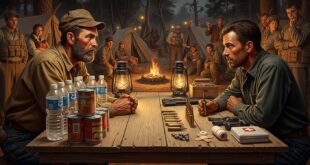Introduction
Imagine for a moment that the grid has gone dark, the banks have locked their doors, and the food supply has vanished overnight. Many people tell themselves that if such a scenario ever came true their neighborhood would stick together, that friends on the same street would pull resources and survive side by side. The harsh truth is that history shows otherwise. When trust collapses the people most likely to turn against you are not faceless looters from a distant city but the neighbors you once waved to every morning.
Preparedness culture often talks about gangs, governments, and natural disasters, but it is the ordinary people next door who represent the clearest danger. Once resources run dry even those who seem decent can become dangerous. Hunger, fear, and desperation change human behavior in ways most do not want to admit. Understanding the collapse of trust is essential for survival, and that means looking at both history and psychology to see what happens when civility breaks down.
The Fragile Foundation of Trust
Trust is the invisible glue that holds civilization together. Without it every interaction becomes a risk and every agreement becomes meaningless. Brené Brown has defined it simply as “choosing to make something important to you vulnerable to the actions of someone else.” That definition may sound gentle in peacetime, but in the aftermath of collapse it takes on a far darker meaning because vulnerability becomes a potential death sentence.
The decline of trust has been measurable for decades. Research from the Institute for Family Studies shows that in 1974 forty four percent of Americans had regular interactions with their neighbors, but by 2022 that number had dropped to twenty eight percent. This steady erosion means that when disaster strikes fewer communities have the cohesion needed to withstand pressure.
Trust depends on stability. We believe our food is safe because we trust the store, the farm, and the regulators. We believe our homes are secure because we trust that our neighbors will not break in while we are away. When the stabilizers of law and economy collapse these assumptions vanish. That is why panic buying and hoarding erupt at the first sign of disruption, and why after a true societal collapse trust evaporates almost overnight.
When Neighbors Become Threats
Jared Diamond, in his landmark book Collapse: How Societies Choose to Fail or Succeed, argued that hostile neighbors were often a decisive factor in civilizational breakdown. The Norse colonies in Greenland collapsed not only from climate shifts but also because they failed to cooperate with or defend against their neighbors. The Maya and other ancient cultures also fell in part because of endless local conflict that turned neighbors into bitter enemies. You can read more background on this in the Wikipedia summary of Collapse.
Modern sociology gives us the concept of “collective efficacy” which means the ability of a community to maintain order through informal trust and cooperation. Strong neighborhoods with trust deter crime even when police presence is weak, but neighborhoods with little trust quickly descend into chaos. When collapse hits, the decisive factor in whether your neighbors are allies or threats comes down to how much trust remains.
It is easy to believe that your neighbors will stay friendly when times are good, but when their children are hungry and your pantry is full, those bonds can turn into resentments. A neighborhood barbecue can transform into a battlefield overnight if desperation takes hold. History shows again and again that proximity combined with scarcity is a recipe for conflict.
Psychological Triggers of Broken Trust
Psychologists studying scarcity have found that when resources are perceived as dwindling, people behave more irrationally and selfishly. They hoard, they lie, and they justify actions they would never consider in times of abundance. This is the psychology of collapse. Scarcity magnifies fear and fear corrodes trust.
Danilo Brozović, a researcher quoted in The Guardian, warned that “We need dramatic social and technological changes” to avoid collapse. His warning was not just about climate but about the fragility of human systems in general. Once people lose confidence in those systems they quickly turn to self-preservation at any cost.
In practice this means that in a collapse scenario neighbors will not approach you as friends but as competitors. They will assume betrayal before cooperation. Rumors spread quickly, envy grows stronger, and the moral boundaries that once kept people civil begin to disappear. Even ordinary families may justify theft or violence by telling themselves it is the only way to protect their loved ones.
Real World Lessons from Collapse
The decline of Easter Island’s society ended in violent clan warfare as neighbors turned on each other when resources ran out. The fall of Rome left small communities fractured into suspicion and raids rather than cooperation. Argentina’s financial collapse in 2001 offers a modern lesson, with middle class communities suddenly facing food riots and widespread theft from those who just months earlier had been normal citizens.
Disasters in America also give us glimpses of what happens when order collapses. After Hurricane Katrina the veneer of civility shattered in New Orleans. Looting and violence were reported across the city. Some of the most desperate acts were not committed by outsiders but by neighbors who knew where resources were hidden. These examples are reminders that collapse does not bring out the best in people. It brings out the most primal.
One prepper wrote in a forum after a blackout, “I used to believe my neighbors would have my back. After two nights without power I realized they were already eyeing my generator like wolves.” That single line captures the danger. In collapse scenarios the real threat is not far away. It is across the fence.
Survival Strategies When Trust Fails
Preparedness is often reduced to lists of supplies, but real survival requires strategy for human behavior. You cannot afford to assume that trust will remain.
First, practice operational security. Do not reveal the extent of your stockpiles. Keep your supply chains and storage areas discreet. If people do not know what you have they cannot target you for it.
Second, establish boundaries. Fences, barriers, and even visible signs of readiness can serve as deterrents. In a collapse predators look for weak targets. If your home appears prepared they may seek easier victims.
Third, build selective alliances. Not every neighbor is a threat. Some may become partners if trust is carefully built. Forming a small group with shared defense and resource management can provide strength, but always maintain limits on what you disclose.
Finally, plan for hostility. Assume that at least some neighbors will eventually become threats. Have defensive measures ready, escape routes planned, and communication protocols within your household. Survival means preparing for betrayal as much as for storms or power outages.
Rebuilding Trust After Collapse
As grim as collapse may be, human beings are wired to rebuild. History shows that after the fall of Rome, smaller communities eventually established new forms of order. After Argentina’s collapse, barter networks and neighborhood assemblies formed to fill the void. The same pattern will repeat in future crises.
Rebuilding trust requires intentionality. Shared rituals, faith, and mutual defense create cohesion. The lesson for preppers is to guard trust fiercely in the early stages of collapse, but also to leave room for cooperation later when the dust settles. Survival is not just about living through the first weeks. It is about having the foundations to rebuild a community when the time comes.
Conclusion
The collapse of trust may be the most dangerous part of any disaster. While movies portray gangs and distant threats, the truth is that the most immediate danger comes from neighbors. They know your patterns, they know your weaknesses, and in desperate times they may see you not as a friend but as a resource.
To survive you must understand the fragility of trust, the lessons of history, and the strategies of defense. You must guard your supplies, audit your relationships, and prepare for the moment when the people you once waved to across the street become the ones you fear most.
Survival is about more than gear. It is about psychology, strategy, and caution. If you prepare for the collapse of trust you stand a far better chance of surviving the collapse of society itself.
Frequently Asked Questions
| Question | Answer |
|---|---|
| 1. Why are neighbors considered a bigger threat than outsiders in a collapse? | Because they know your routines, your property, and possibly your supplies, making them more capable of targeting you when desperation strikes. |
| 2. Has history really shown neighbors turning hostile during collapse? | Yes, from the fall of Rome to Argentina’s financial crisis, communities often fractured into local conflict when resources became scarce. |
| 3. How can I tell if my neighbors might become a problem? | Watch for signs of desperation, envy, or dependency. People who never prepared are more likely to pressure or target those who did. |
| 4. What is the best way to protect supplies from neighbors? | Practice operational security by keeping stockpiles discreet, spreading them across multiple hiding spots, and avoiding casual conversations about prepping. |
| 5. Should I form alliances with neighbors after a collapse? | Only with extreme caution. Build alliances slowly, share limited resources, and set clear boundaries to prevent betrayal. |
| 6. What is “collective efficacy” and why does it matter? | It is the strength of social trust and cooperation in a community. High collective efficacy deters crime, while low trust communities quickly collapse into conflict. |
| 7. How can fences or barriers really help in collapse situations? | Visible boundaries signal that your property is defended. Predators prefer easy targets, so even modest defenses can make you less appealing. |
| 8. Is it possible to rebuild trust after collapse? | Yes, once immediate survival pressures ease, people often form new bonds through barter networks, faith, or shared defense groups. |
| 9. Should I tell anyone about my stockpile? | No. The fewer who know, the safer you are. Even well-meaning neighbors may talk, which can make you a target. |
| 10. What is the single most important lesson about neighbors and trust? | Assume trust will collapse under pressure. Prepare for betrayal but stay open to rebuilding alliances later when conditions stabilize. |
 Survive Our Collapse Building Self-Reliance in an Uncertain World
Survive Our Collapse Building Self-Reliance in an Uncertain World




